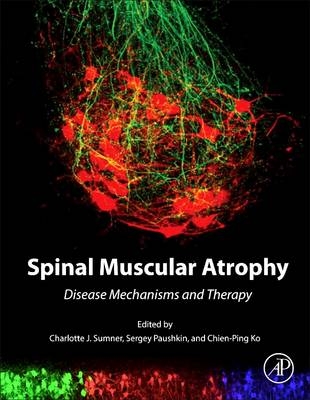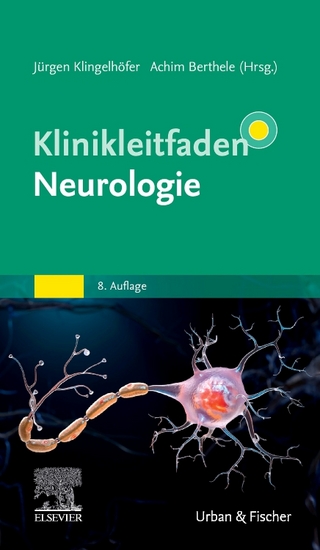
Spinal Muscular Atrophy
Academic Press Inc (Verlag)
978-0-12-803685-3 (ISBN)
This book provides a comprehensive accounting of recent advances in basic and clinical research that covers SMA clinical features and standards of care, multifaceted aspects of SMN protein functions and SMA disease pathology, various animal models, and biomarkers, as well as current therapeutic development.
This title is ideal for graduate students/postdocs and principal investigators who are already in the SMA field and need to keep updated on recent findings and approaches, and for those who are new to, or would like to join, the field. Likewise, users will find an excellent source of reading for biotech/pharma scientists, clinical researchers, and practitioners, regulators, and patients and their advocacy organizations. Furthermore, this book is a handy reference for researchers and clinicians who may want to apply the research strategies and therapeutic approaches in SMA to other rare diseases.
Dr. Charlotte J. Sumner is an Associate Professor of Neurology and Neuroscience at Johns Hopkins University School of Medicine. She received her B.A. from Princeton University and her M.D. from the University of Pennsylvania School of Medicine. She completed internal medicine internship and neurology residency at the University of California San Francisco and neuromuscular fellowship at Johns Hopkins University School of Medicine. Her scientific training included Neurogenetics fellowship at the National Institute of Neurological Disorders and Stroke. Dr. Sumner cares for patients with inherited diseases of motor neurons and peripheral nerves such as spinal muscular atrophy (SMA) and Charcot-Marie-Tooth (CMT) disease and co-directs the Johns Hopkins CMT clinic. Dr. Sumner’s research focuses on the genetic and cellular pathogenesis of SMAs with particular attention to therapeutics development for these disorders utilizing cell and mouse models and human tissues. This work has included identification of novel genetic causes of these disorders, characterization of molecular and cellular mechanisms underlying disease pathogenesis, and preclinical development of therapeutics now advancing to clinical trials in SMA patients. Dr. Sumner’s laboratory research has been funded by the National Institute of Neurological Disorders and Stroke, Muscular Dystrophy Association, Cure SMA, the Spinal Muscular Atrophy Foundation, Spinal Muscular Atrophy Research Team, Ujala Foundation, and the Howard Hughes Medical Institute. She is an Associate Editor of the journal Experimental Neurology and advisor to several companies developing treatments for SMA as well as nonprofit foundations including the Packard Center for ALS research, ALS Association, Cure SMA, and the SMA Foundation. Dr. Sergey Paushkin is Director of Research at the Spinal Muscular Atrophy (SMA) Foundation. He is responsible for coordinating research efforts of pharmaceutical, biotech, academic, and contract research organizations with the goal of bringing therapeutics to patients with SMA. Dr. Paushkin has more than 20 years of experience in biomedical research related to rare diseases and has been working in the SMA field since 1998. His work on SMA started during postdoctoral training at the Howard Hughes Medical Institute (University of Pennsylvania), where he studied molecular mechanisms of the disease, including the organization and function of the SMN complex. Dr. Paushkin continued working on SMA at PTC Therapeutics, where he established the SMA program and led drug discovery efforts, prior to moving to the SMA Foundation. Dr. Paushkin’s expertise in SMA extends from molecular mechanisms of disease pathogenesis to drug discovery and development of therapeutics. Dr. Paushkin’s work is focused on implementing strategies to overcome translational barriers in preclinical and clinical research by establishing and leading collaborations between industry, academic institutions and CROs, as well as developing strong relationship with the SMA community. Dr. Paushkin received his MD from the Russian State Medical University and PhD in Biochemistry from the Cardiology Research Center, Moscow. His undergraduate research was focused on the molecular basis of prion diseases, including prion protein conversion. Dr. Chien-Ping Ko is a Professor of Neurobiology at University of Southern California Dornsife College of Letters, Arts and Sciences. Dr. Ko received his B.S. from National Taiwan University in Taipei, Taiwan, and Ph.D. from Washington University in St. Louis. Dr. Ko completed his postdoctoral training at University of Colorado Medical Center in Denver, and at the National Institute of Neurological Disorders and Stroke, NIH, in Bethesda. He served on the editorial board of the Journal of Neurocytology and Neuron Glia Biology and edited a special issue on the Neuromuscular Junction (NMJ) for the Journal of Neurocytology in 2003. Dr. Ko received an NIH Research Career Development Award and grants including past/current supports from NIH, NSF, Muscular Dystrophy Association, the ALS Association, Cure SMA, the Dhont Family Foundation, and the SMA Foundation. Dr. Ko is interested in the NMJ as a model synapse to better understand synaptic structure, function, formation, repair, and maintenance, as well as synapse-glia interactions. His current research focuses on the cellular and molecular mechanisms of the pathogenesis of spinal muscular atrophy (SMA), particularly the possible contribution of motor circuit defects to the pathogenesis of SMA, as well as the role of different cell types in SMA disease mechanisms and potential therapy. In addition, his lab pursues translational research by testing molecules that could potentially be used to treat SMA. Dr. Ko collaborates with many SMA researchers, both in academia and industry, with the hope to develop a novel concept of SMA disease mechanisms and potential therapy for this devastating disease.
Section I. Clinical Features and Diagnosis of SMA 1. Spinal Muscular Atrophy: 125 Years Later and on the Verge of a Cure 2. Developmental Aspects and Pathological Findings in Spinal Muscular Atrophy 3. Standard of Care for Spinal Muscular Atrophy 4. Strategy for the Molecular Testing of Spinal Muscular Atrophy
Section II. Cellular and Molecular Mechanisms of the Disease 5. Transcriptional and Splicing Regulation of Spinal Muscular Atrophy Genes 6. The Function of Survival Motor Neuron Complex and Its Role in Spinal Muscular Atrophy Pathogenesis 7. RNA-Processing Dysfunction in Spinal Muscular Atrophy 8. Axonal and Neuromuscular Junction Pathology in Spinal Muscular Atrophy 9. Motor Circuit Dysfunction in Spinal Muscular Atrophy 10. Contributions of Different Cell Types to Spinal Muscular Atrophy Pathogenesis 11. Temporal Requirements for the Survival Motor Neuron Protein 12. Spinal Muscular Atrophy Disease Modifiers
Section III. Cell and Animal SMA Models 13. Cell Culture Models of Spinal Muscular Atrophy 14. Nonmammalian Animal Models of Spinal Muscular Atrophy 15. Mammalian Models of Spinal Muscular Atrophy
Section IV. Therapeutic Development 16. Spinal Muscular Atrophy Therapeutics Development 17. Small Molecule Approaches to Upregulate SMN Expression From the SMN2 Locus 18. Antisense-Oligonucleotide Modulation of SMN2 Pre-mRNA Splicing 19. Gene Transfer in Spinal Muscular Atrophy 20. Neuroprotection As a Therapeutic Approach for Spinal Muscular Atrophy 21. Skeletal Muscle in Spinal Muscular Atrophy As an Opportunity for Therapeutic Intervention 22. Addressing Cell Therapy for Spinal Muscular Atrophy: Open Issues and Future Perspectives
Section V. Clinical Research 23. Spinal Muscular Atrophy Motor Functional Scales and Measures of Pulmonary Function 24. Development and Testing of Biomarkers in Spinal Muscular Atrophy 25. Natural History of Spinal Muscular Atrophy 26. Spinal Muscular Atrophy Clinical Trials: Lessons Learned
| Erscheinungsdatum | 18.11.2016 |
|---|---|
| Verlagsort | San Diego |
| Sprache | englisch |
| Maße | 216 x 276 mm |
| Gewicht | 1610 g |
| Themenwelt | Medizin / Pharmazie ► Medizinische Fachgebiete ► Neurologie |
| Medizin / Pharmazie ► Medizinische Fachgebiete ► Orthopädie | |
| Naturwissenschaften ► Biologie ► Zoologie | |
| ISBN-10 | 0-12-803685-0 / 0128036850 |
| ISBN-13 | 978-0-12-803685-3 / 9780128036853 |
| Zustand | Neuware |
| Haben Sie eine Frage zum Produkt? |
aus dem Bereich


